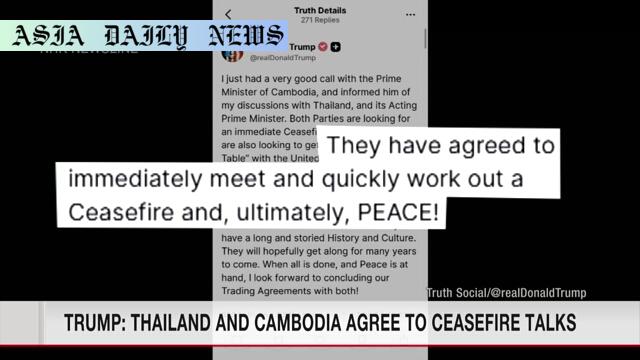Ceasefire talks initiated after US President Trump’s intervention to mediate the ongoing border conflict between Thailand and Cambodia.

US President Trump Steps in to Mediate Thailand-Cambodia Border Dispute
In a significant diplomatic development, US President Donald Trump has announced that Thailand and Cambodia have agreed to initiate ceasefire talks. The ongoing border clashes between the two nations, which have led to alarming levels of violence, prompted international concern and immediate calls for intervention. Trump stated that he had held discussions with Cambodia’s Prime Minister and Thailand’s Acting Prime Minister to address the crises, and both leaders agreed to meet and negotiate a resolution to the dispute.
The hostilities, which have escalated in the disputed border region since Thursday, have already claimed numerous lives. Reports indicate that at least 20 individuals in Thailand have died with more than 30 injured, while Cambodia’s toll stands at 13 dead and dozens wounded. Beyond the fatalities, over 110,000 individuals from both countries have been displaced, creating further pressure on regional stability.
Economic Diplomacy: Trade Agreements Hinged on Peace
One of Trump’s critical strategies in mediating the conflict hinges on economic incentives. He underlined that the negotiations for trade agreements with both nations would depend on the cessation of hostilities and the establishment of lasting peace. While the US President’s involvement emphasizes diplomacy and open communication, his stance reveals a no-tolerance approach toward continued violence. He has clearly stated that no bilateral trade deals would be finalized if the disputes remain unresolved.
Trade negotiations with Thailand and Cambodia are viewed as vital in strengthening economic ties between the US and Southeast Asia. However, this stands as a pivotal moment, where economic advancement becomes interlinked with the efforts for peaceful conflict resolutions in the region. This policy aligns with international expectations and signals a global reliance on both countries to prioritize diplomacy over military engagement.
International Efforts to Resolve the Conflict
Aside from Trump’s intervention, Malaysia has actively attempted to diffuse tensions. Malaysian Prime Minister Anwar Ibrahim, representing the ASEAN chairmanship, has made calls for an immediate ceasefire. This reflects ASEAN’s commitment to fostering peaceful conflict resolutions among its member states. As both Thailand and Cambodia are part of this regional group, the pressure from neighbors adds another layer of urgency to the negotiations.
The ongoing conflict not only threatens lives and displaces communities but also unsettles broader regional cooperation. The commitment of regional powers and international players, such as the US, showcases how pivotal this issue is for Southeast Asian stability and global diplomacy.
The Humanitarian Crisis: A Call for Immediate Action
Beyond the negotiations and trade implications, the crisis has left behind disturbing humanitarian consequences. With over 110,000 people uprooted from their homes, the need for international aid has grown exponentially. Displaced individuals face limited access to food, water, and shelter, leaving humanitarian agencies overwhelmed by the demand for assistance. The rising casualties and displacement figures highlight the sharp urgency in bringing about a resolution.
Post-ceasefire talks, both countries will face significant challenges in providing aid and rebuilding affected regions. Restoring normalcy for displaced families and reconstructing communities will require not only governmental support but international collaboration. The focus will likely shift from militaristic engagements to effectuating sustainable rehabilitation programs for citizens on both sides.
Conclusion
The ceasefire initiative marks a crucial milestone in resolving the Thailand-Cambodia border dispute. By connecting trade discussions to peace efforts, President Trump seeks to encourage broader cooperation between the two nations. The involvement of ASEAN leadership further reinforces the importance of collective regional stability. In the face of such crises, it is imperative for diplomatic channels to work in tandem with humanitarian efforts to bring lasting peace and aid to those affected.
Commentary
Trump’s Role in Conflict Mediation
President Trump’s intervention in the Thailand-Cambodia conflict highlights an interesting dynamic in international diplomacy. While the US has historically engaged in Southeast Asian affairs through trade and strategic partnerships, directly addressing regional conflicts doesn’t always take precedence. Trump’s involvement demonstrates a blend of diplomacy and pragmatism, juxtaposing peace negotiations with promises of economic incentives. Linking ceasefire talks to potential trade deals is a strategic move that reflects the intricate balance of diplomacy and economics in international relations.
The Role of ASEAN in Regional Conflicts
The ASEAN bloc’s active involvement portrays the importance of regional cooperation in conflict resolution. As Malaysia holds the rotating chairmanship, Prime Minister Anwar Ibrahim’s appeal for an immediate ceasefire reflects ASEAN’s ongoing commitment to peace-building. Regional organizations like ASEAN bring a localized perspective to international affairs, strengthening cooperative efforts and ensuring that member nations remain aligned toward harmony.
Impact Beyond the Disputed Borders
One cannot overlook the human cost of this conflict. With thousands displaced and families mourning the untimely loss of loved ones, the situation requires more than just diplomatic engagement. Humanitarian aid organizations must play a pivotal role in providing relief and long-term rehabilitation for those impacted. As nations develop strategies to mediate, equal importance must be given to addressing the immediate suffering of the displaced.
Ultimately, the resolution of this conflict will serve as a reminder of the fragile nature of peace among nations with deep-seated disputes. Whether nations rely on trade leverage, regional pressure, or humanitarian concerns, the focus must remain on fostering sustainable diplomacy.


